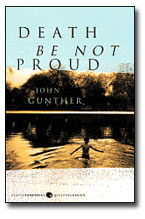Books |
Death Be Not Proud
John Gunther
By
Published: Jan 01, 2007
Category:
Memoir
“Death Be Not Proud” could have been the worst book ever written. Consider: John Gunther, Jr. loses his only son to a brain tumor in 1947, when the boy is just 17. And Johnny was no ordinary boy — he was brilliant, caring, funny. The kind of kid about whom, after his death, people say, “He was loved by everyone he ever met.”
And that’s just the summary. In fact, this kid was off the charts. He did original thinking in mathematics and wrote to Einstein — and Einstein wrote back to encourage him. Unable to attend his boarding school because of his tumor, he got all his work done, aced his college admissions tests and would have gone to Harvard had he lived. And, through his 15-month ordeal of operations and treatments and diets and doctors and hope and despair, he never showed his parents how much he was afraid.
Here’s how amazing: When his surgeon told Johnny he had a brain tumor, his immediate response was “Do my parents know this? How shall we break it to them?”
Imagine having a kid like that. Your only kid. And then sitting down and typing 150 pages about him.
Only the geezers among you will recognize the author, but John Gunther was, in his day, a megastar journalist. Just after World War II, he published a book called “Inside Europe,” and it was so successful he went on to write a series of “Inside” books. His novels flopped, but no matter. He was a born journalist — he knew how to tell a story with style and economy.
And “Death Be Not Proud” is the proof.
“Johnny came home for the Christmas holiday in 1945, and he looked fit and fine.” That’s the first sentence of Chapter One, and it’s a model. You know the boy is going to die. You know you’re in for an emotional wringer. But you also know this father is going to serve it up straight, adult to adult — he’s inviting you to rise to his level.
Big ideas? They’re offered as sparingly as adverbs: “What I am trying to tell, however fumblingly and inadequately, is the story of a gallant fight for life, against the most hopeless odds, that should convey a relevance, a message, a lesson perhaps, to anyone who has ever faced ill health.” What he doesn’t need to say: That’s you, dear reader, that’s all of you, later if not today.
This is the story of an emergency — can the Gunthers find a cure for the tumor before it takes their son? — and so the writing is, correctly, terse. Over this non-fiction medical thriller Gunther lays a story just as exciting: Johnny’s effort to preserve his intellect, to make his mind triumph over his body.
Of course there is no hope. Of course — cruelly — Johnny gets better. Several times. Only to relapse. Each time, Gunther just lays it out. You can feel him fraying as he writes, reliving how he frayed as he lived it. But he didn’t crack then and so, if only for accuracy, he won’t crack now. [To buy “Death Be Not Proud” from Amazon, click here. For the Kindle edition, click here.]
There is a scene in this book that should be required reading for everyone who ever has to write. It occurs at the end, when Johnny leaves his bed in New York to attend graduation at Deerfield Academy in Western Massachusetts. He’s desperately ill — he’ll die just eight days later — but he’s determined to walk into chapel with his class and grasp his diploma in his left hand, just like his friends. Gunther takes you through that walk, step by step, the chapel rocking with cheers — good luck forgetting those pages.
And then the end. The doctors are — let Gunther have this metaphor — “helpless flies now, climbing across the granite face of death." The world contracts. Now it’s mother, father, son, in the saddest of scenes:
Johnny died at 11:02 P.M. Frances reached for him through the ugly, transparent, raincoat-like curtain of the oxygen machine. I felt his arms, cupping my hands around them, and the warmth gradually left them, receding very slowly upward from his hands. For a long time some warmth remained. Then little by little the life-color left his face, his lips became blue, and his hands were cold. What is life? It departs covertly. Like a thief, Death took him.”
An epilogue follows, but that’s it, really. What can I say? Emotion doesn’t come cleaner. You could throw a coin against those sentences and it would bounce back — there’s not a weak thought, an excess word.
“Death Be Not Proud” was published in 1949. It isn’t likely to go out of print any time soon. The saga of a boy dying? Sure, it grabs you and holds you. But that’s because the broken, grieving man who wrote it was so professional he got out of the way and just… told the story.


